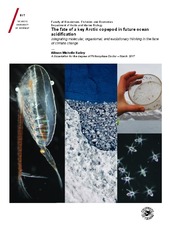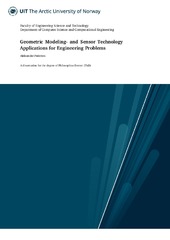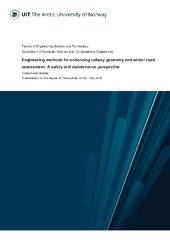The fate of a key Arctic copepod in future ocean acidification: Integrating molecular, organismal, and evolutionary thinking in the face of climate change
Permanent lenke
https://hdl.handle.net/10037/10963Åpne
Thesis (PDF)
Paper III:Thor, P., Bailey, A., Halsband, C., Guscelli, E., Gorokhova, E., Fransson, A.: “Seawater pH predicted for the year 2100 affects the metabolic response to feeding in copepodites of the Arctic copepod Calanus glacialis”. Also available in PLoS ONE 2016, 11(12):e0168735. (PDF)
Dato
2017-05-05Type
Doctoral thesisDoktorgradsavhandling
Forfatter
Bailey, Allison MichelleSammendrag
Uptake of anthropogenic carbon dioxide (CO2) into the world’s oceans is increasing seawater acidity in a process termed ocean acidification. This is predicted to have harmful effects on a variety of marine organisms. With the greatest and fastest changes in pH expected to occur the Arctic seas over the next 100 years, the need for understanding the effects of low pH on Arctic marine organisms is pressing. This thesis examines the effects of projected levels of ocean acidification on the physiology of a key component of the Arctic marine ecosystem, the copepod Calanus glacialis, using molecular, organismal, and evolutionary methodologies to investigate the effects of low pH throughout its lifespan, in combination with other stressors (food availability) and across geographically distant sub-populations (to predict their capacity for adaptation or acclimation in the future). Young stages of the copepod, potentially the most sensitive, were tolerant to realistic pH levels for future ocean acidification: the nauplii developed successfully from egg to naupliar stage N6 at all four pH treatments investigated (pH 7.5, 7,7, 7.9 and 8.05). Gene expression N6 nauplii supported the organismal-level tolerance observed, indicating only mild gene expression and no stress response to low pH. Detrimental effects were found, however, in the young copepodite stages (C2-C4), which indicated an energetic cost at low pH. However, differences in this response between geographically distant, and potentially genetically isolated sub-populations showed that those that lived in a low pH environment tolerated it better, indicating that C. glacialis may be able to alleviate these detrimental effects over time. C. glacialis populations face a myriad of environmental changes driven by global warming and ocean acidification in the Arctic, and while they may experience declines due to the interactions of these multiple stressors, they likely will not experience declines primarily due to ocean acidification.
Beskrivelse
The papers I, II and III of this thesis are not available in Munin.
Paper I: Bailey, A., Thor, P., Browman, H. I., Fields, D. M., Runge, J., Vermont, A., Bjelland, R., Thompson, C., Shema, S., Durif, C. M. F., Hop, H.: “Early life stages of the Arctic copepod Calanus glacialis are unaffected by increased seawater pCO2”. Available in ICES Journal of Marine Science 2016.
Paper II: Bailey, A., De Wit, P., Thor, P., Browman, H. I., Bjelland, R., Shema, S., Fields, D. M., Runge, J. A., Thompson, C., Hop, H.: “Regulation of gene expression underlies tolerance of the Arctic copepod Calanus glacialis to CO2-acidified seawater”. (Manuscript).
Paper IV: Thor, P., Bailey, A., Dupont, S., Calosi, P., Søreide, J., De Wit, P., Guscelli, E., Loubet-Sartrou, L., Deichmann, I., Candee, M., Svensen, C., King, A. L., Bellerby, R. G.J.: “Potential for rescue from future ocean acidification by extant physiological differences among distinct Arctic copepod populations”. (Manuscript).
Paper I: Bailey, A., Thor, P., Browman, H. I., Fields, D. M., Runge, J., Vermont, A., Bjelland, R., Thompson, C., Shema, S., Durif, C. M. F., Hop, H.: “Early life stages of the Arctic copepod Calanus glacialis are unaffected by increased seawater pCO2”. Available in ICES Journal of Marine Science 2016.
Paper II: Bailey, A., De Wit, P., Thor, P., Browman, H. I., Bjelland, R., Shema, S., Fields, D. M., Runge, J. A., Thompson, C., Hop, H.: “Regulation of gene expression underlies tolerance of the Arctic copepod Calanus glacialis to CO2-acidified seawater”. (Manuscript).
Paper IV: Thor, P., Bailey, A., Dupont, S., Calosi, P., Søreide, J., De Wit, P., Guscelli, E., Loubet-Sartrou, L., Deichmann, I., Candee, M., Svensen, C., King, A. L., Bellerby, R. G.J.: “Potential for rescue from future ocean acidification by extant physiological differences among distinct Arctic copepod populations”. (Manuscript).
Forlag
UiT The Arctic University of NorwayUiT Norges arktiske universitet
Metadata
Vis full innførselSamlinger
Copyright 2017 The Author(s)
Følgende lisensfil er knyttet til denne innførselen:
Med mindre det står noe annet, er denne innførselens lisens beskrevet som Attribution-NonCommercial-ShareAlike 3.0 Unported (CC BY-NC-SA 3.0)
Relaterte innførsler
Viser innførsler relatert til tittel, forfatter og emneord.
-
Geometric Modeling- and Sensor Technology Applications for Engineering Problems
Pedersen, Aleksander (Doctoral thesis; Doktorgradsavhandling, 2020-10-20)In applications for technical problems, Geometric modeling and sensor technology are key in both scientific and industrial development. Simulations and visualization techniques are the next step after defining geometry models and data types. This thesis attempts to combine different aspects of geometric modeling and sensor technology as well as to facilitate simulation and visualization. It includes ... -
Iceberg Drift-Trajectory Modelling and Probability Distributions of the Predictions
Baadshaug, Ole (Master thesis; Mastergradsoppgave, 2018-06-29)Moving icebergs represent a major problem for shipping, as well as for oil and gas installations in ice infested waters. To be able to take actions against hazardous icebergs, it is necessary to develop models for prediction of iceberg drift trajectories. Many models have been developed in order to do so, using different approaches. These approaches can be divided into two main categories, dynamic ... -
Engineering methods for enhancing railway geometry and winter road assessment: A safety and maintenance perspective
Brustad, Tanita Fossli (Doctoral thesis; Doktorgradsavhandling, 2020-06-22)In many areas around the world there are limited transportation possibilities when travelling between key cities. If these areas also experience demanding weather conditions or geography, getting from A to B, during difficult conditions, is usually not optimal in regards to accessibility, safety, and comfort. Under challenging conditions, two essential elements in strengthening accessibility, safety, ...


 English
English norsk
norsk



